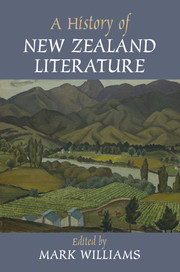Book contents
- Frontmatter
- Contents
- Notes on Contributors
- Acknowledgments
- Introduction
- PART I 1760–1920
- PART II 1920–1950
- PART III 1950–1972
- PART IV 1972–1990
- 16 From Hiruharama to Hataitai: The Domestication of New Zealand Poetry, 1972–1990
- 17 The Novel, the Short Story, and the Rise of a New Reading Public, 1972–1990
- 18 ‘DBed and chocolate wheaten beaten’: Drama Defining the Nation, 1972–1990
- 19 The Māori Renaissance from 1972
- PART V 1990–2014
- Index
17 - The Novel, the Short Story, and the Rise of a New Reading Public, 1972–1990
from PART IV - 1972–1990
Published online by Cambridge University Press: 05 April 2016
- Frontmatter
- Contents
- Notes on Contributors
- Acknowledgments
- Introduction
- PART I 1760–1920
- PART II 1920–1950
- PART III 1950–1972
- PART IV 1972–1990
- 16 From Hiruharama to Hataitai: The Domestication of New Zealand Poetry, 1972–1990
- 17 The Novel, the Short Story, and the Rise of a New Reading Public, 1972–1990
- 18 ‘DBed and chocolate wheaten beaten’: Drama Defining the Nation, 1972–1990
- 19 The Māori Renaissance from 1972
- PART V 1990–2014
- Index
Summary
Two powerful currents brought about the social sea change of the 1970s and 1980s: Māori activism, including a powerful new literary presence, and feminism. In these decades other things changed too, literary theory, cultural politics, and readership. A new internationalism arrived in New Zealand as literary and intellectual trends, notably postmodernism, became visible, as in Michael Morrissey's 1985 anthology, The New Fiction. Keri Hulme won the Booker Prize for the bone people in 1985. The literary and intellectual landscape became more diverse as small independent publishers were established and new magazines founded, some for specialist audiences like the feminist publications Broadsheet and Hecate or the journal And, whose aim was to oppose and reform local literary discourse. Feminism gave a new prominence and marketability to woman writers. The New Women's Press was founded in Auckland in 1982 following the success of women's presses internationally, and mainstream publishers realised that women readers had always had a large market share. The advent of Witi Ihimaera and Patricia Grace as published writers not only developed a Māori readership but also fostered the publication of Māori-centred books including those in te reo Māori (Māori language), and a Māori publisher, Huia Press, was founded in 1991. In 1972 Heinemann published Witi Ihimaera's collection of stories Pounamu Pounamu. Although there was a long history of Māori publishing short fiction, poems, and other pieces, particularly in Te Ao Hou, Pounamu Pounamu was the first book-length work of fiction produced by a Māori author. It became a much-loved school and university text and created a Pākehā (European) readership for Māori fiction. Focused on the fictional village Waituhi, the stories recreate a pastoral version of Māori community life. Their lyrical register has also been critiqued for sentimentality. Ihimaera followed up with two linked novels Tangi (1973) and Whanau (1974), which are based on the same fictional community, then a second collection of stories, The New Net Goes Fishing, in 1976. In the 1980s Ihimaera stopped writing for a time, concerned that his portrayal of the Māori world was perpetuating dated ideas and perhaps responding to criticism that his work was naively sentimental about Māori life, failing to register Māori poverty, alienation, and social disadvantage. He eventually rewrote his early work, but his whole body of fiction has always been consistent in its primary objective, which is to represent the Māori world, Te Ao Māori, from the inside.
- Type
- Chapter
- Information
- A History of New Zealand Literature , pp. 246 - 261Publisher: Cambridge University PressPrint publication year: 2016



